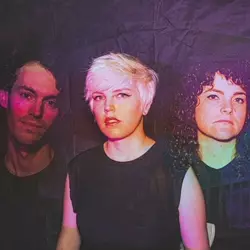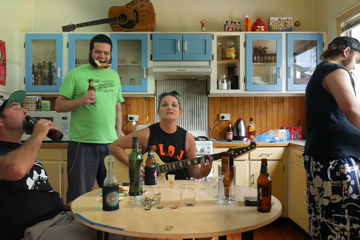 Cable Ties
Cable Ties"So do you know Shrimpwitch?" asks Cable Ties singer/shredder Jenny McKechnie, peeking over the top of a menu at Fina's Vegetarian Cafe (we can highly recommend the Special Dried Noodle). Turns out both bands had their first show together at Wetfest, the mini-fest that McKechnie organises with her other outfit Wetlips.
"We both just started around the same time and, yeah... 'Cause Wetfest was just in our backyard it was a pretty casual affair, we both just jumped on first and uh, had a hit out, played like five songs."
"It was a good impetus to get the thing happening," adds bassist Nick Brown. "'Cause we'd sort of had a few jams and then, like, a backyard gig is a pretty low bar to clear, as far as feeling competent goes. But it gives you the opportunity to go, 'Alright, second week in March. We need to be able to play four or five songs.' Then you kind of, get it together."
And so they did. Two years and a regimen of relentless gigging later, playing with everyone from The Peep Tempel to The Kills, and the trio have developed a sound that could peel an apple.
Don't miss a beat with our FREE daily newsletter
"We played, just, heaps of shows," says McKechnie, "We had September I think of that year where we played at The Old Bar like seven times or something ridiculous."
"Well, it was at least four times," suggests drummer Shauna Boyle, "'cause I know we were calling it our unofficial Old Bar residency."
"Yep, I remember. I had 13 gigs in that month," says McKechnie.
"We both had something like that," adds Boyle, who also plays with Customer.
"And there was seven or eight Cable Ties ones," McKechnie continues. "So yeah, that was awesome, just like, that stage where you say just 'yes' to everything and really sort of get stuff a bit tighter.
"I miss doing that," admits McKechnie. "I don't know, that's what I love about playing. It's just, playing with all your mates at the Oldie on a bloody, Tuesday night, and not having to worry about all the music industry bullshit. Which we have to deal with a bit more now," laughs the singer.
Despite reservations about the wider functions of the music machine, the band have found the perfect environment in Melbourne's thriving live scene, which led to signing with Poison City Records ahead of the release of their self-titled debut LP. They joined the beloved local label — home to the likes of Batpiss and Camp Cope — "a few of months ago now", McKechnie confirms, although it sounds more like a companionable partnership than anything you'd call a 'contract'.
"That's what I love about playing. It's just, playing with all your mates at the Oldie on a bloody, Tuesday night, and not having to worry about all the music industry bullshit."
"I guess we don't even call it, or see it, as signed," considers Brown, which gets a couple of affirmatives from his bandmates. "They're puttin' out the record, if that makes sense."
"It's us going to Andy [Hayden] and Thommo [Sarah Thompson] every so often like, 'Weugh! Whadda we do?! [laughs] Help!'" squeaks McKechnie. "Which they're always really good at responding to."
Apart from the vocals and some guitar — or "the good shreds" — the record was mostly knocked out over a couple of winter days in a Fairfield warehouse studio that Brown laconically describes as "super cold". It was an experience they survived by huddling around bar-style heaters and drinking "a lotta tea with whiskey in it", shares McKechnie, but it was a particular struggle for Brown.
"I'm the soft one," he says, which McKechnie expands with, "Too delicate to pick up the bass amp."
"Sometimes I pick up the bass amp. I'm pretty good between about 20 and 22 degrees Celsius. I'm like — I think I'm a pretty good musician in that kind of range. Like, as long as it's not humid or too dry."
"Too hot," says McKechnie. "Or too cold," adds Boyle. Brown nods amiably, "Yeah."
Album complete and frostbite averted, the trio are set for their debut national tour. It's a fairly gruelling seven-week schedule — maintaining their regular work week while jumping interstate each weekend. "I think that's just the reality for bands, you know?" says Brown. "In Australia the distances are too vast, the audiences are too small... You can’t just knock out Monday, Tuesday, Wednesday nights. Especially not outside of three largish cities."
The real challenge isn't just logistical, however. It's the also the band's first major step away from the community and support network that they've built right here on their Melbs home turf.
"It'll be a big learning experience for us when we go on our national tour," says Boyle. "And to see how we are received outside of our bubble."
"Yes. Playing to an audience of people who came to see us, not to see a different band," adds McKechnie.
"I mean we've played a couple shows in Sydney," points out Boyle, "and in rural towns outside of Melbourne in Victoria. But not really anywhere — we've never played in Brisbane. We played in Hobart once. We've never played in Newcastle, we've never played in Canberra — all these places that we're going to for the first time. So yeah, I think it'll be a fantastic experience, but yes. We'll see how we go."
Entering the national arena is an exciting but daunting proposition. From 'pay to play' shows when the door doesn't cover the sound guy to getting lowballed on support slots there are myriad ways to get the shit end of the drumstick making music. The pitfalls change as you progress, but recognition doesn't in any way equal immunity. Leonard Cohen didn't spend his twilight years on the road because he loved touring. Though only having played together a couple of years, Cable Ties have established their politics explicitly. If you've ever heard McKechnie howl "I am not a production unit/I am a human being" until her voice cracks you shouldn't really need SparkNotes to get a grasp of their core principles — but still they get clueless booking agents offering them exciting opportunities like playing support slots out of state at a massive loss. "And for a band that has completely opposite values to us," says Boyle.
"It looks good to have a diverse line-up on your bill when you're a fuckin', dude punk band."
"I don't know," considers Brown. "There's some level of 'whatever' associated with bands that people want to buy into and take advantage of. They wanna, you know — it looks good to have a diverse line-up on your bill when you're a fuckin', dude punk band. And so, if you can offer people fuckin', bullshit money to come and play with you..."
"And then get rewarded for having a diverse line-up," finishes an exasperated McKechnie. "But you know, exploiting them. The bands that are playing with you — great."
"The thing that I love about music is like, the music community in Melbourne," says McKechnie. "And that's, putting on events like Wetfest, and having a music community with pretty strong political values... About people's identities and how you treat each other. And then you sort of move outside this nice Melbourne bubble that you've created for yourself with all these bands and suddenly you realise that the music industry itself is the opposite of that. It's this hyper-exploitative, capitalist thing.
"Suddenly you're getting offers to play for about 5% of the total door cost of some fucking touring band. And they're like, 'The exposure!'"
"Yeah," Boyle nods. "But I mean, if you've only been a band for like six months or something you'd probably just be like, 'Yeah, that's fine.'"
"And if everyone keeps saying yes to that shit," resumes McKechnie, "which, you know, of course people will, because they need to get out there. But if everyone keeps doing it then they'll keep being able to exploit bands."
It's a clever business model, and not one that's limited to the music scene. If you can convince young artists across the creative spectrum that only way to get work is to undercut each other for nothing, and have them thank you for the pleasure, you're laughing. If you're curious about Cable Ties' opinion of practices from that end of the ethical spectrum, have a listen to the unnerving portrayal of forced dependency in album opener and early single The Producer.
"[It] means that people who can't afford to spend their time doing free work aren't going to get into creative industries," says McKechnie. "You're making these creative industries a lot more boring. And the people who should, whose voices should be being heard through art aren't because they can't. They don't have, you know, parents they can fall back on when they're broke. They don't have a safety net to go back to. So if they have to... You have to give up eventually," she finishes with a flat chuckle.















